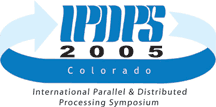Fourth IEEE International Workshop on High Performance Computational Biology
Monday, April 4, 2005
Omni Interlocken Resort, Denver, CO

(Held in conjunction with the International Parallel and
Distributed Processing Symposium)
Monday, April 4, 2005
Omni Interlocken Resort, Denver, CO

(Held in conjunction with the International Parallel and
Distributed Processing Symposium)
Abstract:
Simulations of biological molecules offers a lot of
promise to complement and extend current experiments in the areas of
biophysics and biomedicine. However, there are some serious
limitations that must be overcome before computational methods are
universally accepted. For example, one must be able to examine
timescales that are thousands to billions of times longer than most
typical simulations. How can one surmount such fundamental
computational barriers? I will discuss our solutions to this problem,
which combine novel physical chemistry theory and computational
paradigms. In addition, I will discuss recent applications of these
methods to fundamental questions in biophysics and biomedical
applications, including protein folding, protein-protein association,
protein-ligand binding, and protein misfolding & aggregation.
Speaker Biography:
Prof. Pande's current research centers on the development and
application of novel grid computing simulation techniques to address
problems in chemical biology. In particular, he has pioneered novel
distributed computing methodology to break fundamental barriers in the
simulation of kinetics and thermodynamics of proteins and nucleic
acids. As director of the Folding@Home project,
Prof. Pande has, for the first time, directly simulated protein
folding dynamics with quantitative comparisons with experiment, often
considered a "holy grail" of computational biology. His current
research also includes novel simulation methods for high precision
drug binding affinity calculations, protein design, and synthetic
bio-mimetic polymers.
Prof. Pande received a BA in Physics Princeton University in 1992. There, he was first introduced to biophysical questions, especially in his undergraduate thesis research with Prof. Philip Anderson, a Nobel Laureate in physics. In 1995, he received his PhD in physics from MIT, studying as a NSF Fellow under Profs. Toyoichi Tanaka and Alexander Grosberg. At MIT, Prof. Pande's research centered on statistical mechanical models of protein folding and design, suggesting novel ways to design protein sequences to have the desired stability and folding properties. As a Miller Fellow working with Prof. Daniel Rokhsar at UC Berkeley, Prof. Pande extended this methodology to examine atomistic protein models, laying the foundations for his later work at Stanford University.
Prof. Pande has won numerous awards, including most recently being named to MIT'S TR100 (top young innovators in 2002), a Frederick E. Terman Fellowship (2002), and a Henry and Camile Dreyfus Teacher-Scholar (2003). Prof. Pande is currently an Assistant Professor of Chemistry and (by courtesy) of Structural Biology.
Computational Biology is fast emerging as an important discipline for academic research and industrial application. The large size of biological data sets, inherent complexity of biological problems and the ability to deal with error-prone data all result in large run-time and memory requirements. The goal of this workshop is to provide a forum for discussion of latest research in developing high-performance computing solutions to problems arising from molecular biology. We are especially interested in parallel algorithms, memory-efficient algorithms, large scale data mining techniques, and design of high-performance software. The workshop will feature contributed papers as well as invited talks from reputed researchers in the field.
Topics of interest include but are not limited to:
Papers reporting on original research (both theoretical and
experimental) in all areas of bioinformatics and computational biology
are sought. Surveys of important recent results and directions are
also welcome. To submit a paper, send a postscript or PDF copy of the
paper by email to the workshop's Program Chair, Prof. Nancy Amato
<amato@cs.tamu.edu>.
The paper should not exceed 12 single-spaced pages
(US Letter or A4 size) in 11pt font or larger. All papers will be
reviewed. IEEE CS Press will publish the IPDPS symposium and workshop
abstracts as a printed volume. The complete symposium and workshop
proceedings will also be published by IEEE CS Press on CD-ROM and will
also be available in the IEEE Digital Library.
Authors of selected papers from the workshop will be invited to
submit extended versions of their papers for publication in a
special issue of
IEEE Transactions on Parallel and Distributed Systems
on High-Performance Computational Biology.
| Workshop Paper Due: | November 15, 2004 |
| Author Notification: | December 15, 2004 |
| Camera-ready Paper Due: | January 21, 2005 |
|
David A. Bader Electrical & Computer Engr. Dept. University of New Mexico Albuquerque, NM 87131 USA Phone: +1.505.277.6724 Fax: +1.505.277.1439 Email: dbader@ece.unm.edu |
Srinivas Aluru Dept. of Electrical & Computer Engg. and Lawrence H. Baker Center for Bioinformatics & Biological Statistics Iowa State University 3218 Coover Hall Ames, IA 50011, USA Phone: +1.515.294.3539 Fax: +1.515.294.8432 email: aluru@iastate.edu |
|
Nancy M. Amato Parasol Laboratory Department of Computer Science Texas A&M University College Station, TX 77843-3112 USA Phone: +1 979-862-2275 Fax: +1 979-458-0718 Email: |
For up-to-date information about this workshop, please visit
http://www.hicomb.org/.